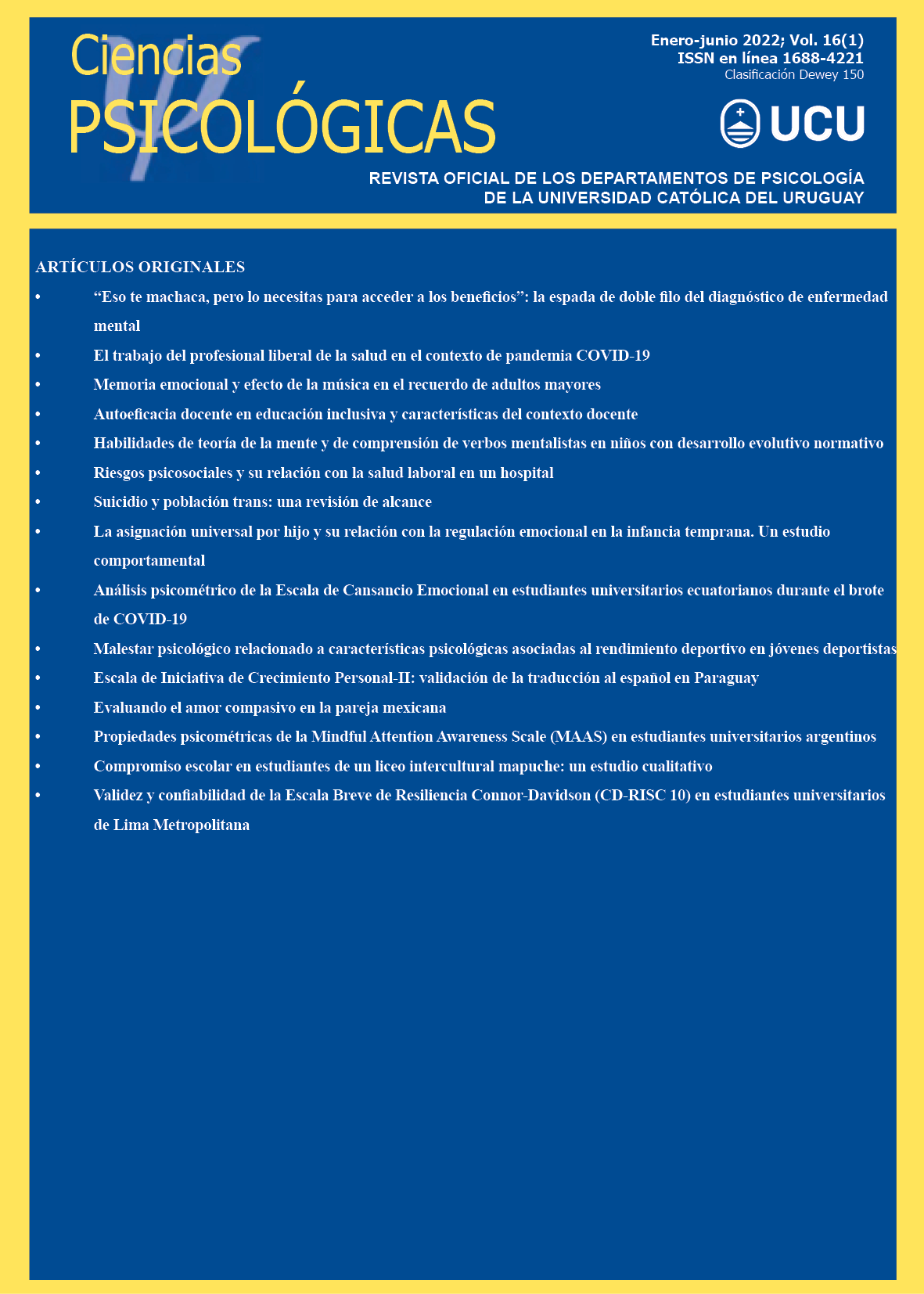Avaliando o amor compassivo no casal mexicano
DOI:
https://doi.org/10.22235/cp.v16i1.2669Palavras-chave:
amor compassivo, empatia, casal, medição, MéxicoResumo
O amor compassivo é um sentimento altruísta que se concentra no bem dos outros. No entanto, apesar da fama do termo, ainda não existe um instrumento de medição para a população mexicana dentro do contexto romântico. Por esse motivo, o objetivo desta pesquisa foi projetar e validar um instrumento que integre adequadamente o construto de amor compassivo nas relações de casal em uma amostra de 900 participantes da Cidade do México. Foi realizada uma análise fatorial exploratória para examinar a conformação fatorial. A escala foi composta por 33 itens agrupados em dois fatores que explicaram 61.96 % da variância, um coeficiente alfa de Cronbach de .973 e uma confiabilidade ômega de .976. Os achados coincidem com os fundamentos das perspectivas teóricas do construto e, como um todo, representam uma contribuição conceitual, metodológica e cultural para o estudo da variável no contexto romântico.
Downloads
Referências
Asociación Americana de Psicología. (2020). Manual de publicaciones de la American Psychological Association (4ª ed.). Manual Moderno.
Berscheid, E. (2010). Love in the fourth dimension. Annual Review of Psychology, 61(1), 1-25. https://doi.org/10.1146/annurev.psych.093008.100318
Cronbach, L. J. & Meehl, P. E. (1955). Construct validity in psychological tests. Psychological Bulletin, 52(4), 281-302. https://doi.org/10.1037/h0040957
Fehr, B. & Sprecher, S. (2009). Prototype analysis of the concept of compassionate love. Personal Relationships, 16(1), 343-364. https://doi.org/10.1111/j.1475-6811.2009.01227.x
Fehr, B., Sprecher, S., & Underwood, L. G. (2009). The science of compassionate love. Theory, research and applications. Blackwell Publishing.
Fehr, B. & Sprecher, S. (2013). Compassionate love: what we know so far. En M. Hojjat & D. Cramer (Eds.), Positive psychology of love, (pp. 106-120). Oxford Press.
Fehr, B., Harasymchuk, C., & Sprecher, S. (2014). Compassionate love in romantic relationships: A review and some new findings. Journal of Social and Personal Relationships. Journal of Social and Personal Relationships, 31(5), 575-600. https://doi.org/10.1177/0265407514533768
García, M. (2002). Desde el concepto de felicidad al abordaje de las variables implicadas en el bienestar subjetivo: Un análisis conceptual. Lecturas: Educación Física y Deportes, 8(48), 1-6.
Goetz, J., Keltner, D., & Simon, E. (2010). Compassion: An evolutionary analysis and empirical review. Psychological Bulletin, 136(3), 351-374. https://doi.org/10.1037/a0018807
Hendrick, C. & Hendrick, S. (1986). A theory and method of love. Journal of Personality and Social Psychology, 50(2), 392-402. http://dx.doi.org/10.1037/0022- 3514.50.2.392
Hernández, R., Fernández, C., & Baptista, P. (2006). Metodología de la investigación. McGraw-Hill Interamericana Editores.
Neff, L. A. & Karney, B. R. (2009). Compassionate love in early marriage. En B. Fehr, S. Sprecher, & L. G. Underwood (Eds.). The science of compassionate love: Theory, research, and applications (pp. 201-222). Blackwell Publishing.
Neto, F. (2012). Compassionate love for a romantic partner, love styles and subjective well-being. Interpersona: An International Journal on Personal Relationships, 6(1), 23-39. https://doi.org/10.5964/ijpr.v6i1.88
Neto, F. & Wilks, D. (2017). Compassionate love for a romantic partner across the adult life span. Europe's Journal of Psychology, 13(4), 606-617. https://doi.org/10.5964/ejop.v13i4.1204
Oman, D. (2011). Compassionate love: accomplishments and challenges in an emerging scientific/spiritual research field. Mental Health, Religion & Culture, 14(9), 945-981. https://doi.org/10.1080/13674676.2010.541430
Perlman, D. & Sánchez-Aragón, R. (2009). Compassionate Love: Concluding Reflections. En B. Fehr, S. Sprecher & L. Underwood (Eds.), The Science of Compassionate Love Theory, Research, and Applications (pp. 433-452). Blackwell Publishing Ltd.
Reis, H., Maniaci, M. & Rogge, R. (2014). The expression of compassionate love in everyday compassionate acts. Journal of Social and Personal Relationships, 31(5), 651-676. https://doi.org/10.1177/0265407513507214
Reyes-Lagunes, I. & García y Barragán, L. F. (2008). Hacia un procedimiento de validación psicométrica culturalmente relevante. En S. Rivera-Aragón, R. Díaz-Loving, R. Sánchez-Aragón & I. Reyes-Lagunes (Eds.), La Psicología Social en México XII (pp. 625-630). AMEPSO.
Rubin, Z. (1970). Measurement of romantic love. Journal of Personality and Social Psychology, 16(2), 265-273.
Sinclair, L., Fehr, B., Wang, W., & Regehr, E. (2016). The relation between compassionate love and prejudice: The mediating role of inclusion of out-group members in the self. Social Psychological and Personality Science, 7(2) 176-183. https://doi.org/10.1177/1948550615609736
Sprecher, S. & Fehr, B. (2005). Compassionate love for close others and humanity. Journal of Social and Personal Relationships, 22(5), 629-651. https://doi.org/10.1177/0265407505056439
Sprecher, S., Fehr, B., & Zimmerman, C. (2007). Expectation for mood enhancement as a result of helping: The effects of gender and compassionate love. Sex Roles, 56(7), 543-549. https://doi.org/10.1007/s11199-007-9192-6
Sprecher, S. & Fehr, B. (2010). Dispositional attachment and relationship-specific attachment as predictors of compassionate love for a partner. Journal of Social and Personal Relationships, 28(4), 558-574. https://doi.org/10.1177/0265407510386190
Sprecher, S., Zimmerman, C., & Abrahams, E. (2010). Choosing compassionate strategies to end a relationship. Effects of compassionate love for partner and the reason for the breakup. Social Psychology, 41(2), 66-75. https://doi.org/10.1027/1864-9335/a000010
Underwood, L. G. (2002). The human experience of compassionate love: Conceptual mapping and data from selected studies. En S. G. Post, L. G. Underwood, J. P. Schloss & W. B. Hurlbut (Eds.), Altruism & altruistic love: Science, philosophy, & religion in dialogue (pp. 72-88). Oxford University Press.
Underwood, L. (2009). Compassionate love: A framework for research. En B. Fehr, S. Sprecher & L. Underwood (Eds.), The science of compassionate love: Theory, Research, and Applications, (pp. 3-25). Blackwell Publishing.
Underwood, L. & Teresi, J. (2002). The Daily Spiritual Experience Scale: Development, theoretical description, reliability, exploratory factor analysis, and preliminary construct validity using health-related data. Annals of Behavioral Medicine, 24(1), 22-33.
Virat, M., Trouillet, R., & Favre, D. (2018). A French adaptation of the Compassionate Love Scale for teachers: Validation on a sample of teachers and correlation with teacher autonomous motivation. Psychologie Française, 63(3), 1-17. https://doi.org/10.1016/j.psfr.2018.03.003
Downloads
Publicado
Como Citar
Edição
Secção
Licença
Direitos de Autor (c) 2022 Universidad Católica del Uruguay

Este trabalho encontra-se publicado com a Licença Internacional Creative Commons Atribuição 4.0.
















